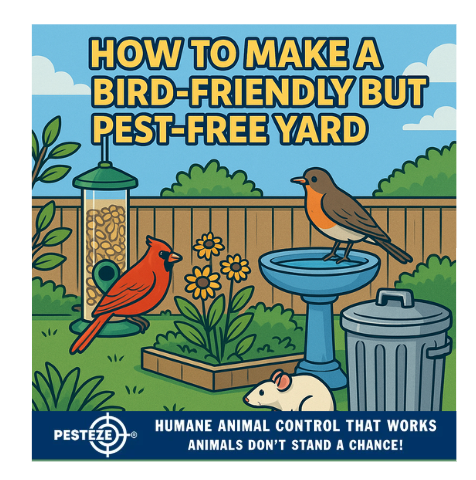HOW TO MAKE A BIRD-FRIENDLY BUT PEST-FREE YARD

HOW TO MAKE A BIRD-FRIENDLY BUT PEST-FREE YARD
SUMMARY
Creating a yard that welcomes birds while keeping pests away requires balance. This guide explains how to design a safe, bird-friendly space that discourages rodents, insects, and other unwanted wildlife.
FEATURES
-
Choose the right feeders: Use pest-resistant bird feeders.
-
Keep food off the ground: Prevent attracting rodents and insects.
-
Use native plants: Provide natural food and shelter for birds.
-
Maintain cleanliness: Regularly clean feeders and birdbaths.
-
Discourage pests: Remove standing water, seal trash, and manage compost.
-
Safe deterrents: Apply non-toxic methods to repel unwanted wildlife.
GUIDE DESCRIPTION
Many homeowners enjoy attracting birds to their yards, but poorly managed spaces can also invite pests like rats, raccoons, or mosquitoes. Learning how to make a bird-friendly but pest-free yard ensures a safe environment for both people and wildlife.
The first step is to choose the right feeders. Squirrel-proof or rodent-resistant bird feeders keep food accessible to birds but discourage pests. Tube feeders with small openings and baffles are particularly effective.
Always keep food off the ground, as spilled seed is one of the biggest attractants for rodents. Position feeders on poles with trays to catch falling seeds, and place them away from decks, patios, or house walls.
In addition to feeders, planting native plants is a natural way to support birds. Berry bushes, seed-producing flowers, and nectar-rich plants provide food sources that don’t attract pests as easily as loose seed. Native shrubs and trees also create safe nesting and shelter opportunities.
Cleanliness is critical. Feeders and birdbaths should be cleaned weekly with mild soap or a bleach solution to prevent disease spread among birds. Removing old seed and refreshing water helps maintain a healthy habitat.
At the same time, discourage pests by practicing good yard management. Eliminate standing water to reduce mosquito breeding, store trash in tightly sealed bins, and manage compost with lids or secure containers. Avoid leaving pet food outside, as this can attract raccoons, rats, and other scavengers.
If pest activity is still a problem, use safe deterrents. Non-toxic repellents like peppermint oil sprays can help discourage rodents without harming birds. Motion-activated sprinklers are another effective option—they startle pests but won’t injure them.
By combining thoughtful bird-friendly practices with pest-prevention strategies, you can enjoy the beauty of songbirds without dealing with unwanted intruders. A well-maintained yard creates a balanced ecosystem that benefits both people and wildlife.
- Saneeth Thota


Comments 0